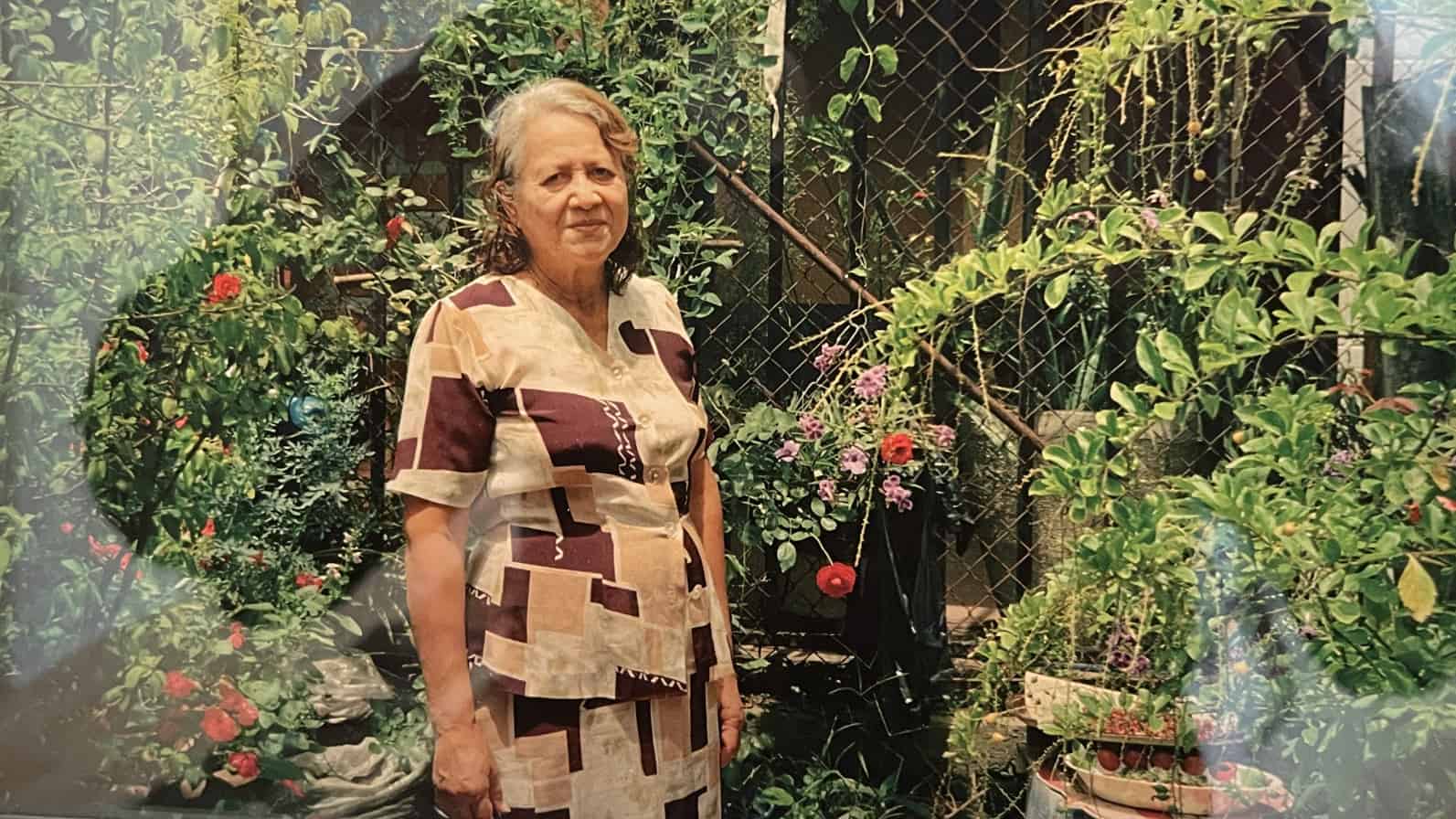A couple walk together on a quiet morning. They cross an open hillside, listening for early songbirds, and they kneel to feel the leaves growing at their feet. They are picking wild thyme, za’atar, as Palestinian families have foraged in the hills for centuries.
As Jumana Manna’s film, Foragers, plays at a meditative pace, a circle of candies ask on their silver wrappers: Who leaves? — the kind of candies families take with them when they leave home in South America to travel across the desert. And tiles of earth hold images of family across generations, from Korea and Africa to Hawa’ii and the gulf coast.
This winter and spring, nationally and internationally acclaimed artists Lorena Molina, Larissa Rogers and Jumana Manna, have come together in Unfortunately It Was Paradise at MCLA’s Gallery 51 in North Adams.
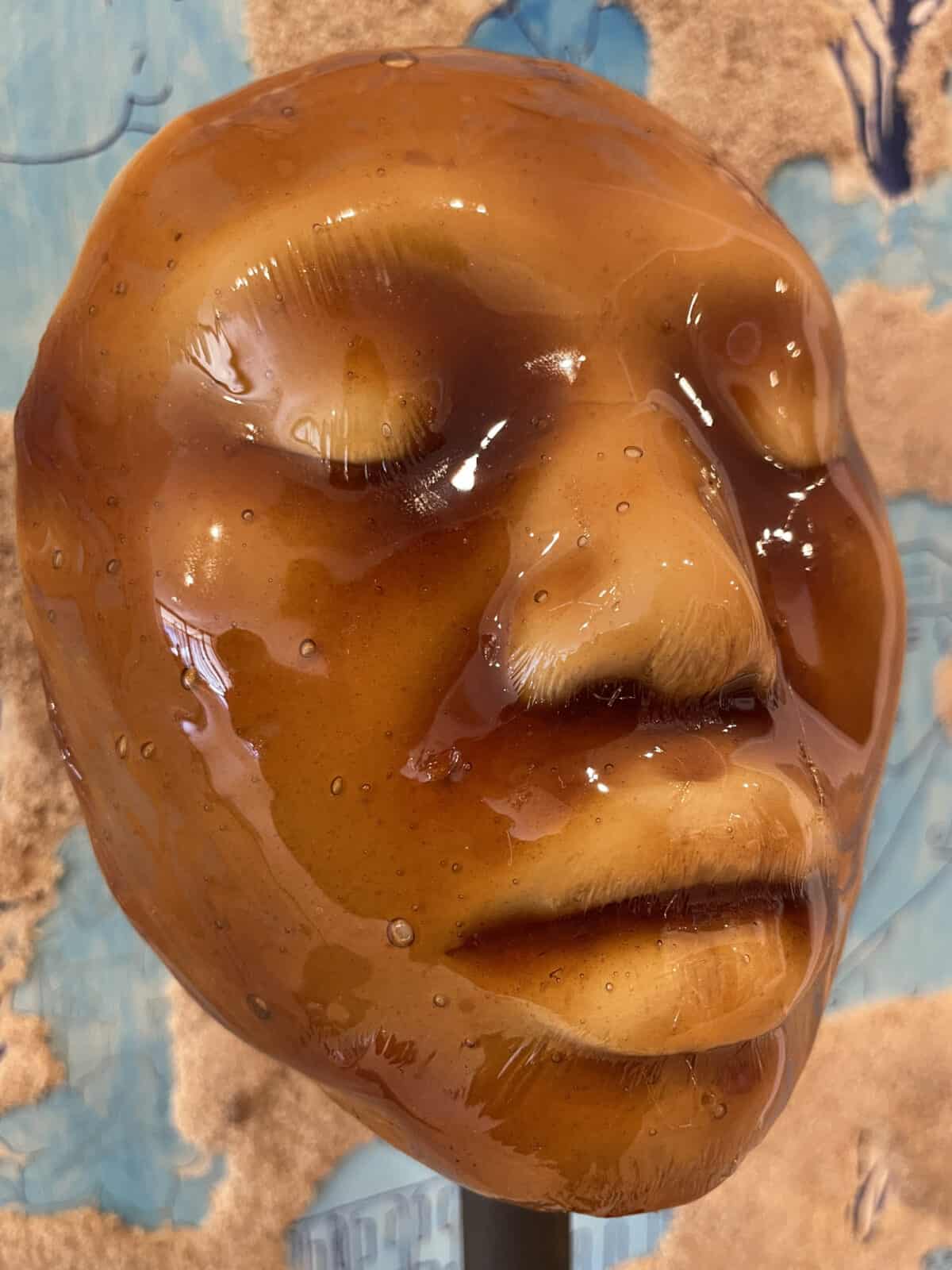
LaRissa Rogers creates porcelain masks of her own face crowned with flowers in 'Unfortunately It Was Paradise' at MCLA in North Adams.
Manna’s film, Molina’s photographs and textile art and Rogers’ paintings and ceramics all weave stories and experiences of migration and ecology, said Eunice Uhm, assistant professor of fine and performing arts at MCLA, walking through the gallery on a sunny spring afternoon.
She has felt connections with their work, she said, through her own experiences of movement, family and land. She is new to the Berkshires. She grew up in the city, and in the two years since she moved here, she has been hiking in the hills and rethinking her own relationship with natural places.
She reflects on experiences of transplanting from one country to another. These three artists raise questions for her, she said, beginning with why people leave home … what kinds of violence and upheaval would cause someone to uproot themselves, and how the climate crisis is making them more acute.
Who do people leave, when they leave home, and at what costs — to them, to their families, to the communities they leave behind? As the artists follow stories of place and displacement, they look with care at what people experience in the places they come to, and how they interact with the people who live there.
Molina lives in Texas now, as assistant professor of photography and digital media in the School of Art at the University of Houston. She is also the founder and the director of Third Space Gallery, a community space and gallery that supports and highlights BIPOC artists in Cincinnati, and she and Uhm first met when Uhm was in graduate school in Ohio.
In this show, she gathers photographs from places she has lived, vivid with container gardens, banana leaves, zinnias, fruiting trees and rows of corn. A tree is flowering as vividly red as flamboyan … and seed pods in a glass jar catch the light on a windowsill when the land outside is spare with winter.
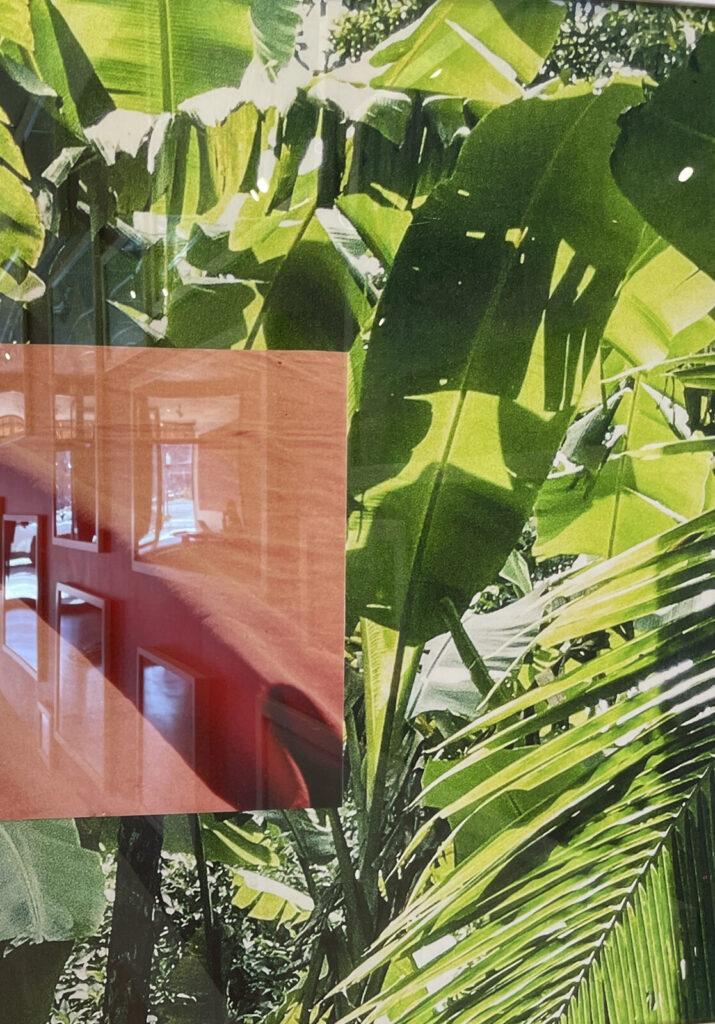
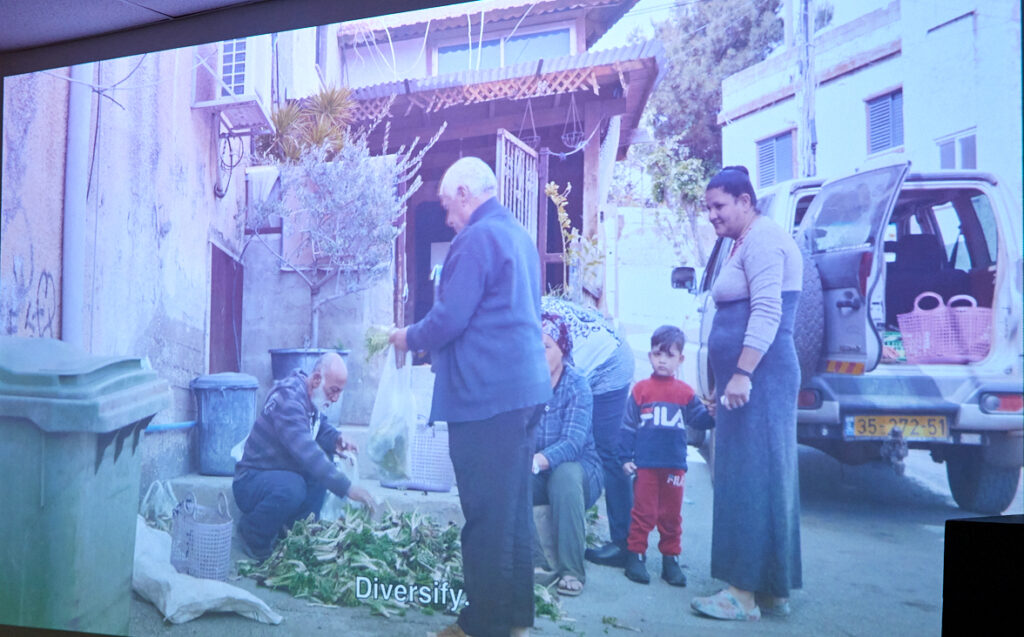
Banana leaves gleam in the sunlight in in Lorena Molina’s photograph, and People gather on a stteet corner near someone seated with a blanket full of herbs in Jumana Manna’s film ‘Foraging,’ in ‘Unfortunately It Was Paradise’ at MCLA in North Adams.
In her work, she often comes back to natural spaces, she explained in a gallery talk at MCLA on March 24. She explores relationships, love and pain, past and present, with her own body.
She recalled a series of photographs she took at El playon in El Salvador, the site of the last volcanic eruption from the San Salvador volcano — El Salvador has 20 active volcanoes in a country the size of New Jersey, she said. And in this place, bodies were dumped during the El Salvadorean civil war.
“The dirt is fertile with the trauma of our history,” she says on her own artist website, describing her work. “I wanted my body to reabsorb the pain of the space. I wanted to feel where the bodies of mi gente were laid to rest. I wanted to be physically marked by the past of my family that I can’t escape.”
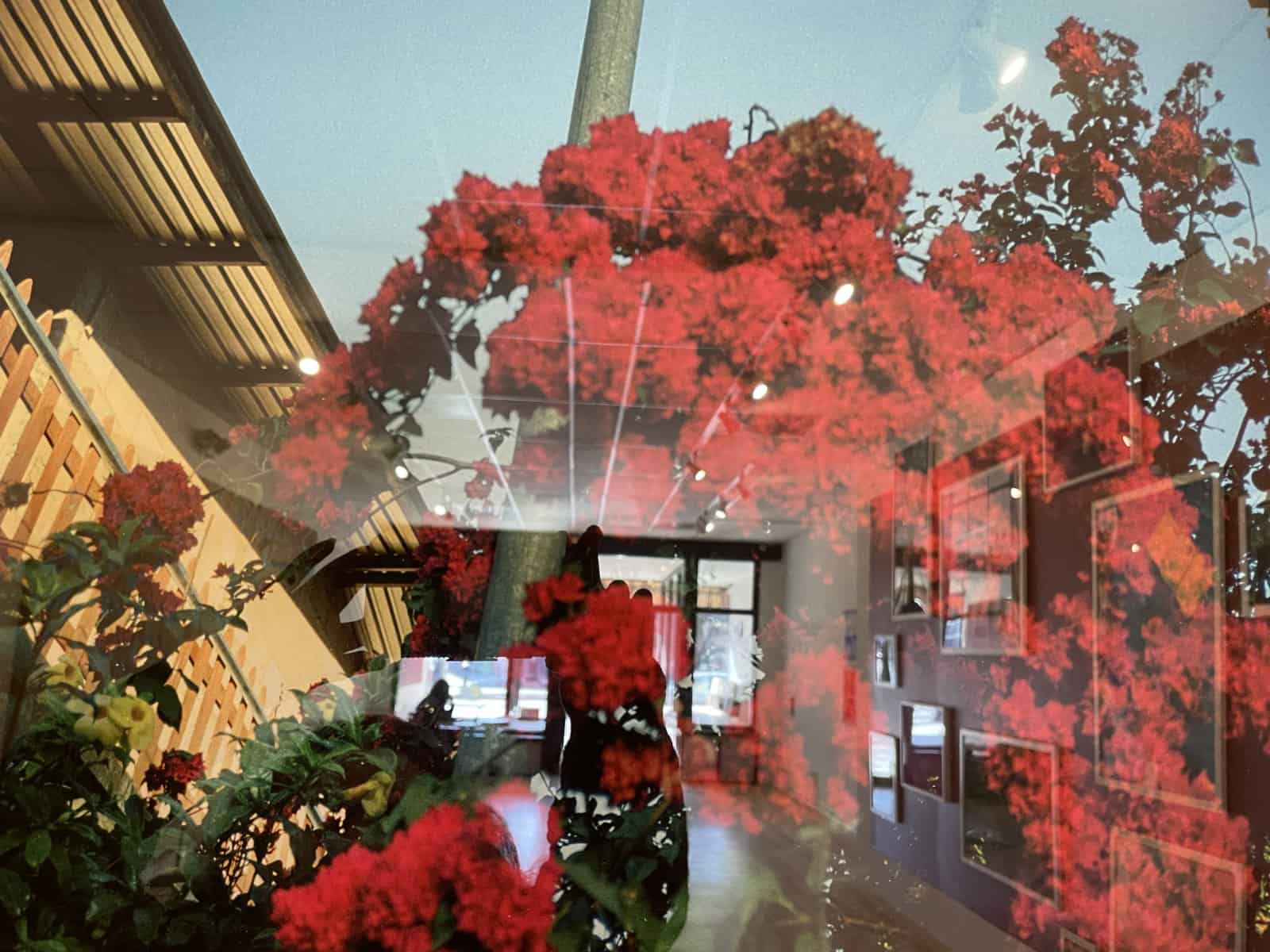
A tree blooms as vividly red as a flamboyan in Lorena Molina's photographs in 'Unfortunately It Was Paradise' at MCLA in North Adams.
Rogers too considers her own body in her work. Porcelain masks here show her face in clay molded on her own skin. Some wear flowers … one is coated in a sheen of melted brown sugar.
She sees a similarity to Molina’s work in her own, she said, in the ways they consider beauty and sweetness, class and power. Filling one wall in this show, Rogers has created a mural coated in a mosaic of brown sugar crystals.
She sees and seeds within the painting her own family’s encounters with the land across time. Her ancestors, her parents and grandparents are Korean and African American, she said at the gallery talk. She celebrates their traditions and their lives. One of the masks wears orchids, as one of her aunts gives orchids to celebrate births in the family. Earth frames photographs of her family.
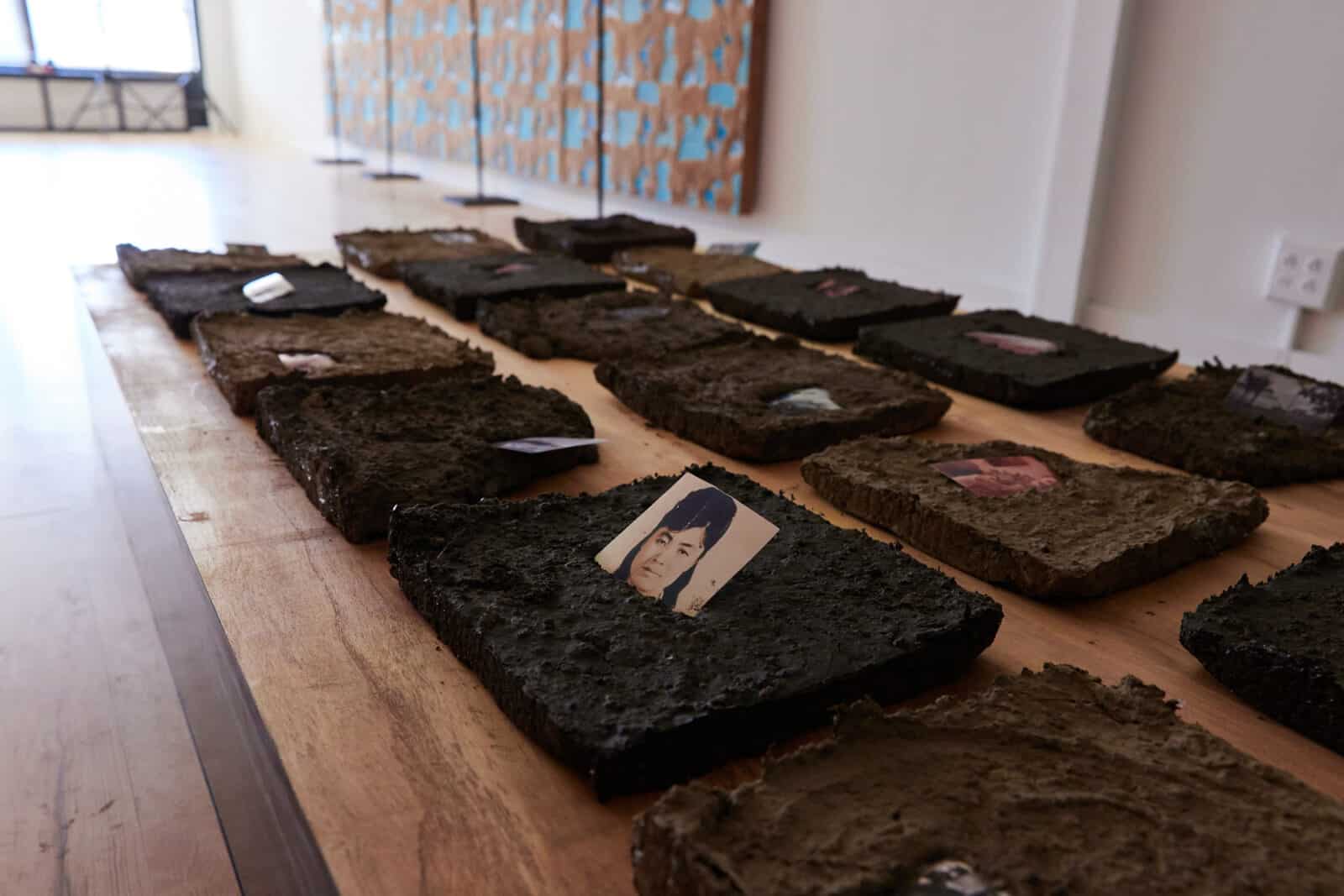
LaRissa Rogers sets family photographs into earth tiles in 'Unfortunately It Was Paradise' at MCLA in North Adams.
And at the same time, she reckons with forces that have shaped their lives. Sugar here has close ties with slavery, she said. Many Black Americans lived and worked and died enslaved on plantations where sugar was produced, in Louisiana, along the gulf coast and in the Caribbean.
Korean immigrants in Hawa’ii also worked in harsh conditions on sugar plantations, Uhm said, tracing Rogers’ family stories in her work. Turning to the wall across the way, she considers the questions sewn into Molina’s wall hangings — Do you feel free? Do you feel safe? For who? And when … and where?
They come from a series, At what cost?, Molina has embroidered with local Latine women from Casa de Paz, Uhm said, an organization that helps Latine women and children who are survivors of domestic violence.
The women gained employment in making these cloth panels, Molina explains on her website, and the work speaks to questions and experiences they have also faced as immigrants to this country. Who do laws protect, she asks, and n this country, where freedom is often given as an ideal, who is really free?
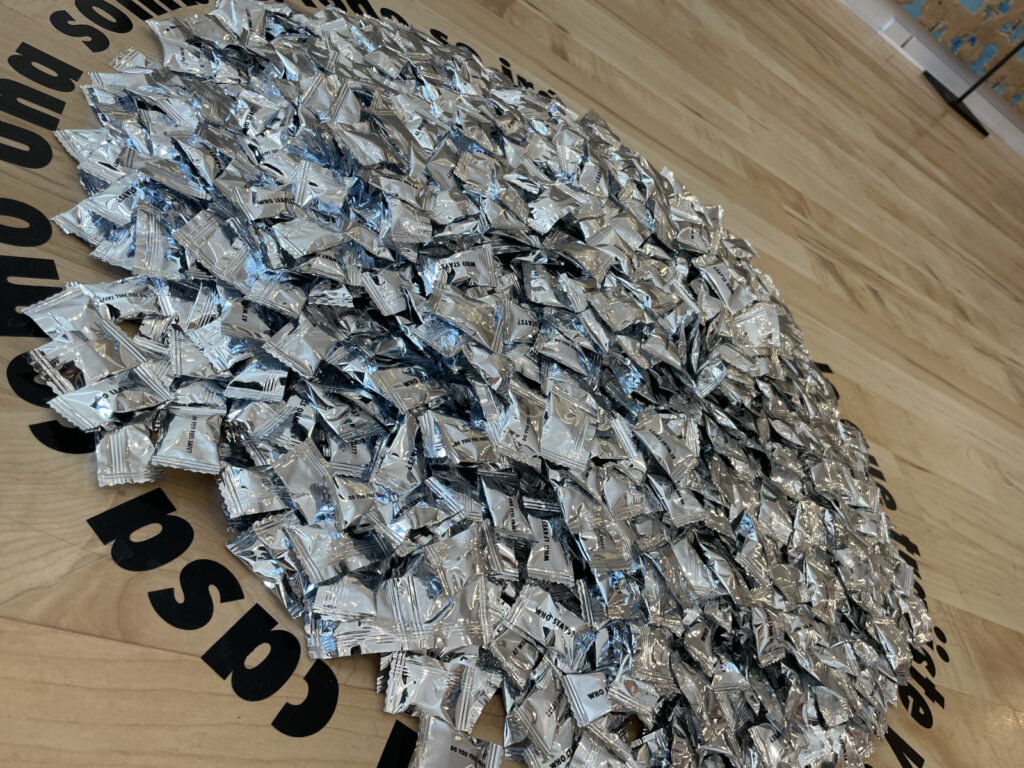
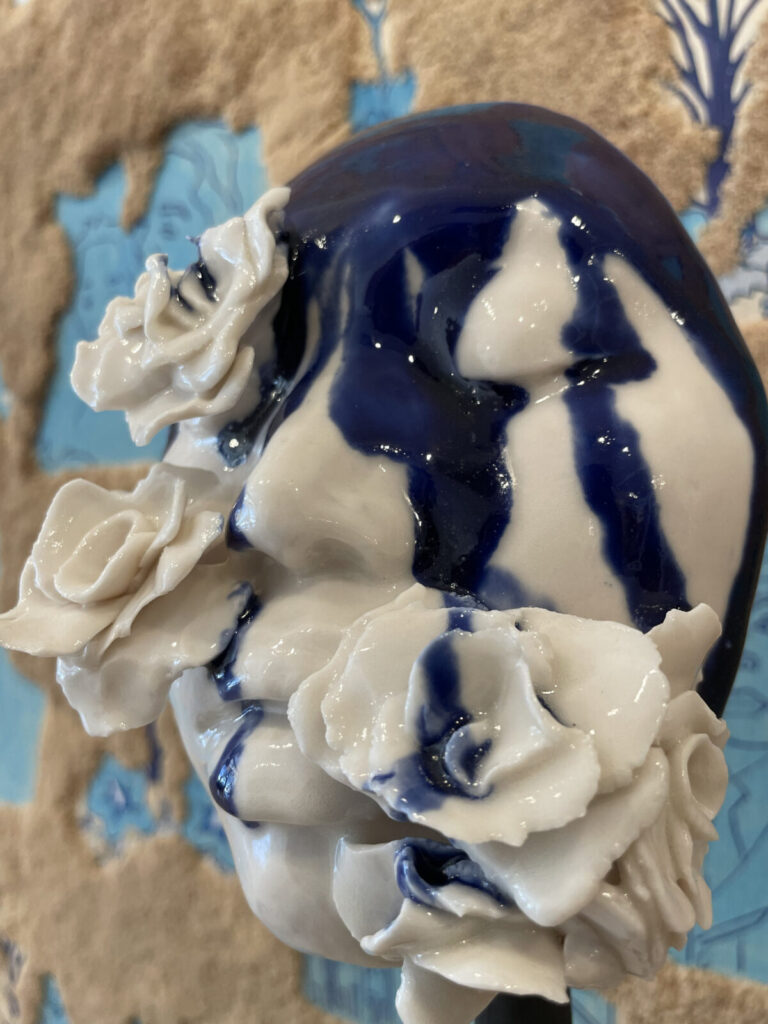
LaRissa Rogers creates porcelain masks of her own face crowned with flowers, and candies raise questions and memories on their silvery wrappers in ‘Unfortunately It Was Paradise’ at MCLA in North Adams.
These questions come home for Uhm, as she considers her own family coming from Korea to the U.S. in the 1990s. Many people, she says, may also face them in the country where they were born.
Manna’s Foragers brings for her powerful questions of freedom and restriction.
Uhm first saw some of Manna’s earlier work at the Museum of Modern Art’s PS21 in New York, she said, and she felt deeply moved by her work and wanted to work with her. In her film, Manna considers a conflict with literal roots.
Israeli law places restrictions on foraging and picking wild plants, Uhm explained. From some perspectives, these restrictions are meant to preserve the land. And at the same time, Palestinian traditions are centuries old.
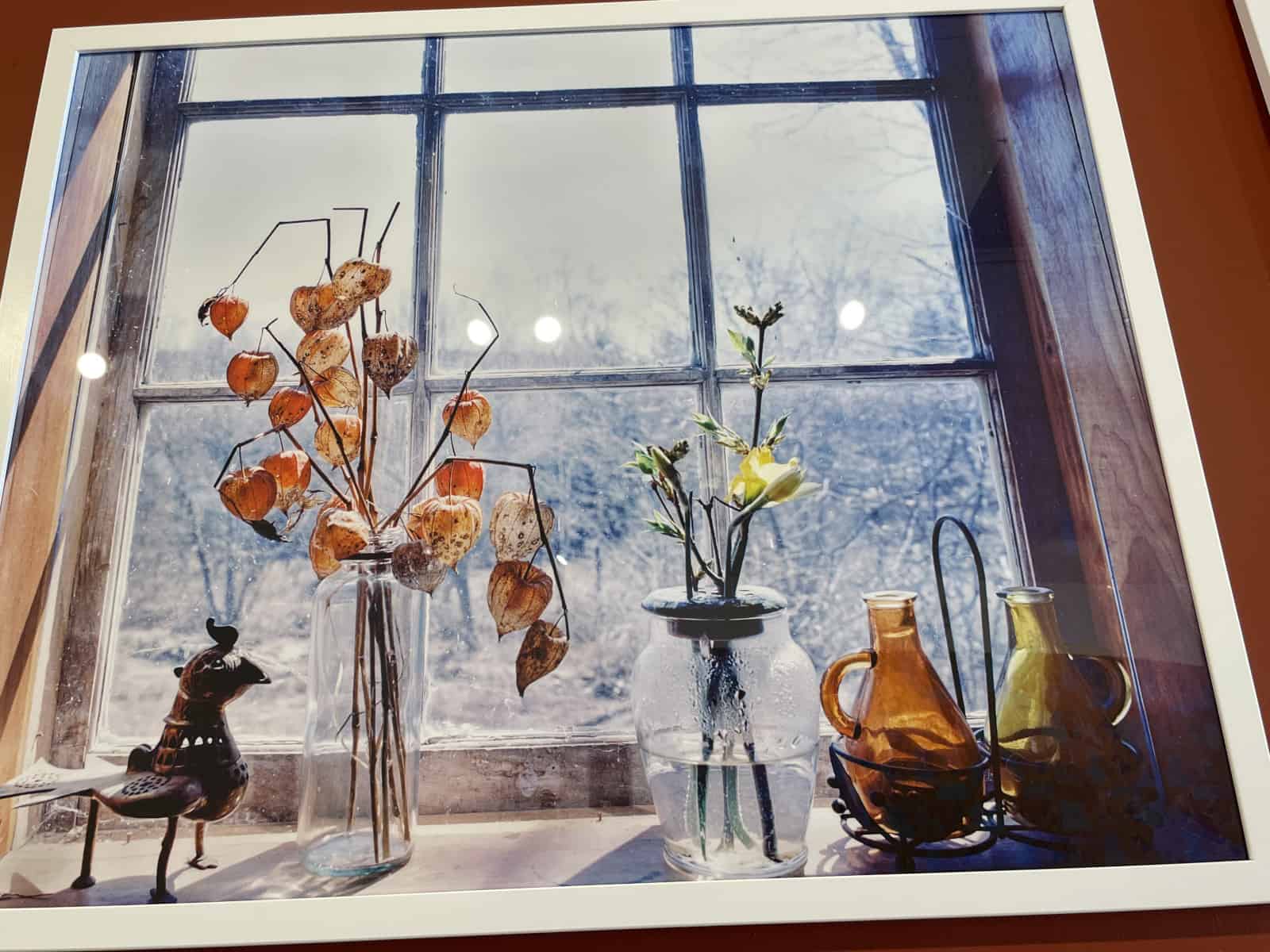
Seed pods catch the loght on a windowsill n Lorena Molina's photographs in 'Unfortunately It Was Paradise' at MCLA in North Adams.
The film, made in the Golan Heights, the Galilee and Jerusalem, blends fiction, documentary and archival footage, Manna says, “to show the impact of Israeli nature protection laws on these customs.”
In her narrative, za’atar is more than a source of food and flavor for Palestinian families. The herb holds a central connection with family and the land, Uhm said, and at the same time she recognizes in the film some echoes of the pain and trauma of the history of the Holocaust.
In the U.S. and in many parts of the world, Uhm said, laws meant to protect the land can harm indigenous voices. She hears Manna’s ideas in conversation with Molina’s work, as they look closely into stories of displacement of people from the lands where they have lived. Who leaves? At what cost? … And who stays?
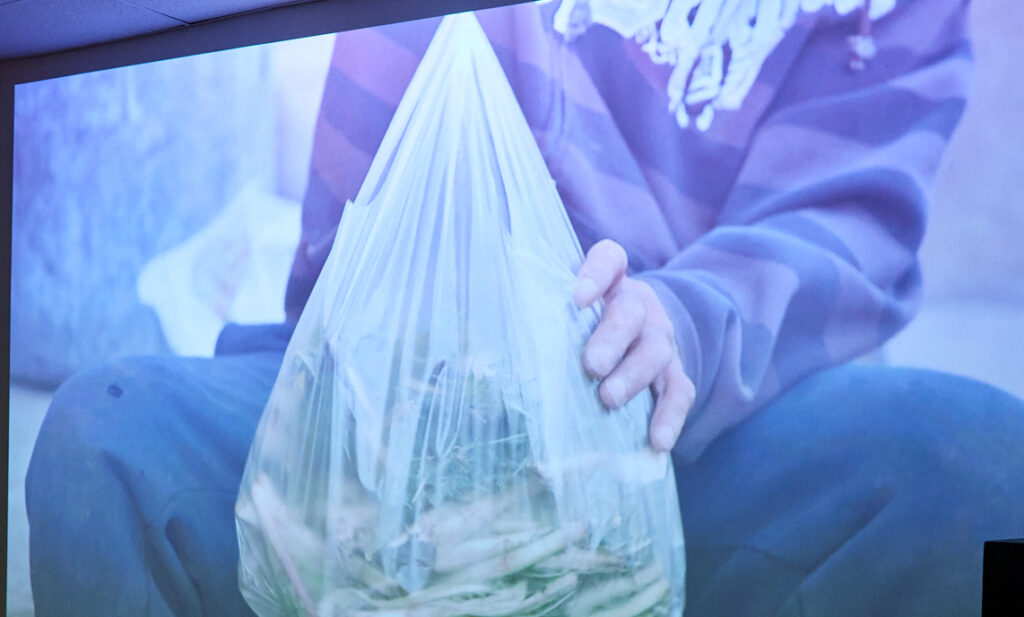
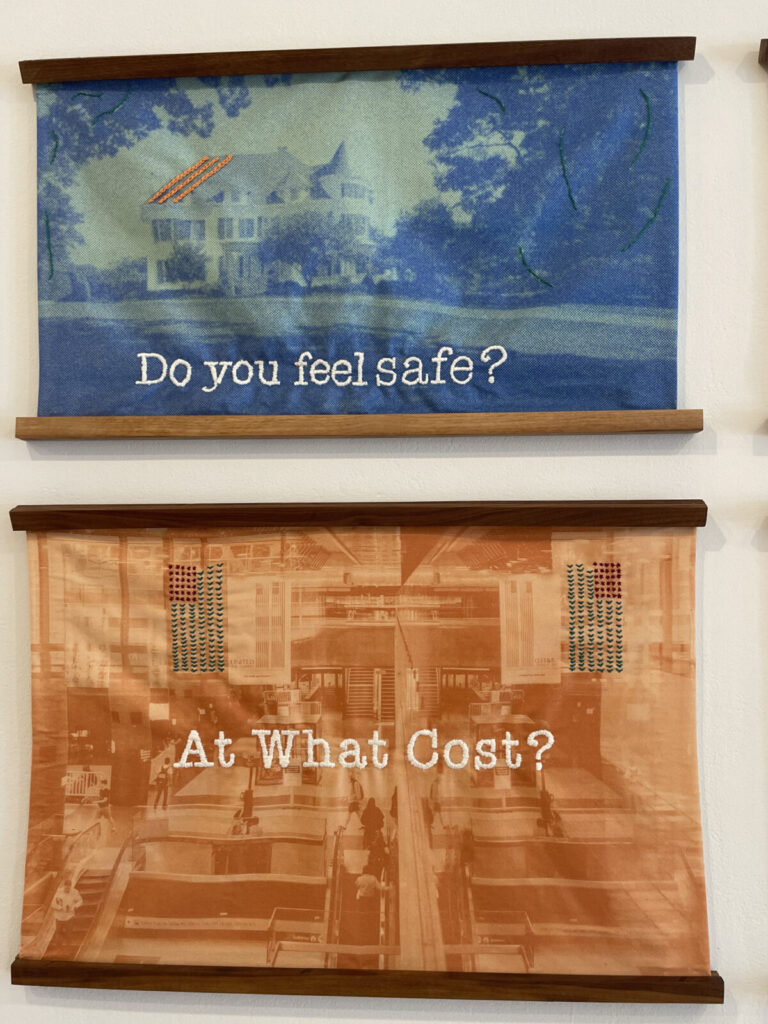
Lorena Molina’s wall hangings ask questions, and Young hands hold a bag filled with herbs in Jumana Manna’s film ‘Foraging,’ in ‘Unfortunately It Was Paradise’ at MCLA in North Adams.
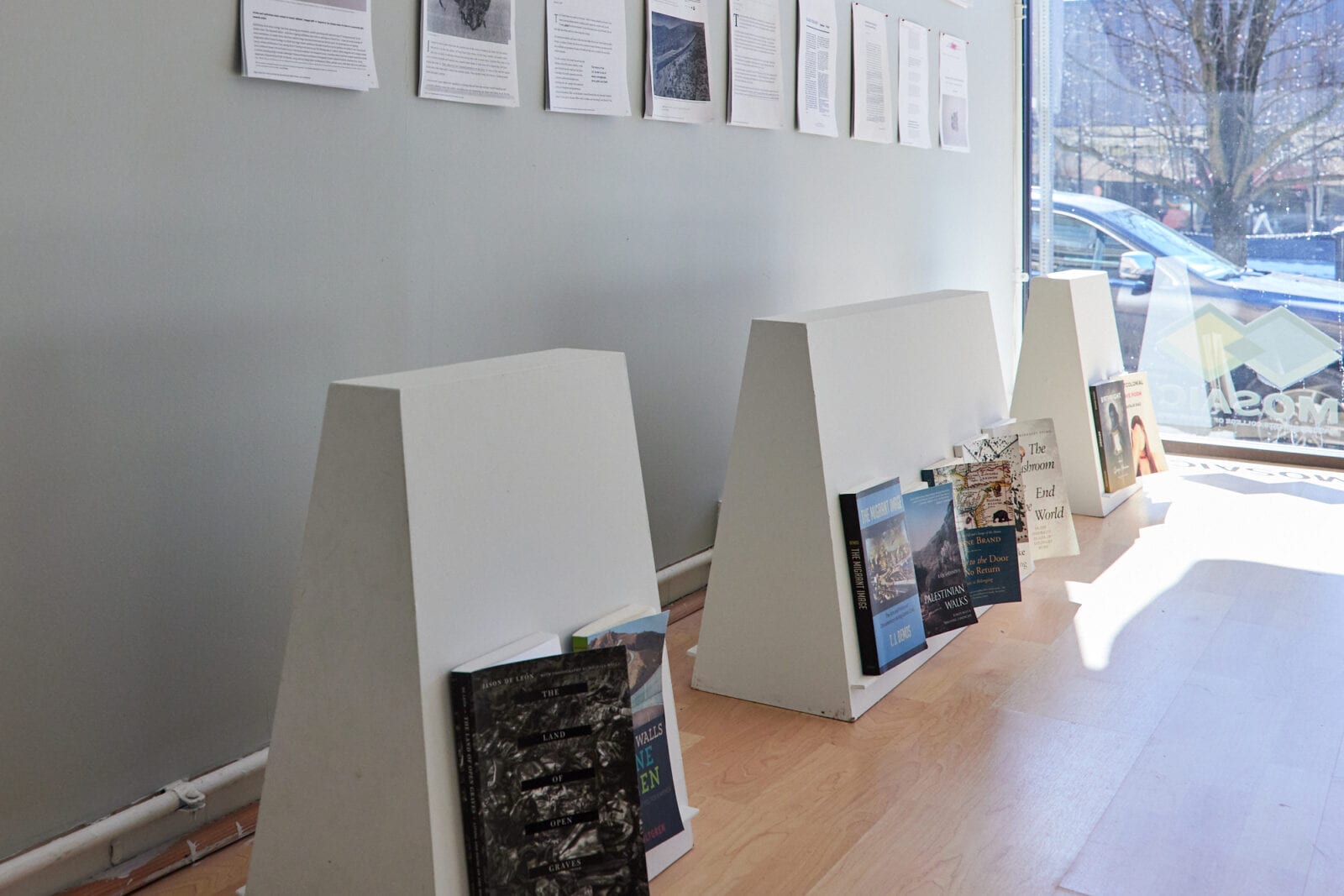
Books line the window at the entrance to 'Unfortunately It Was Paradise' at MCLA in North Adams.

